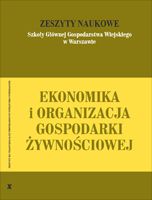Main Article Content
Article Details
European Commission, Directorate for Agriculture, 1998: Agricultural Situation and Prospects in the Central and Eastern Europe. Poland.
MOŚZNiL: Rynek finansowy ochrony środowiska, http://gate.mos.gov.pl.
SIUDEK T., ŚLEDŹ A., 1999: Pozostałe linie kredytowe dla wsi i rolnictwa. [w:] Wieś Jutra, nr 2(7).
SZACKI J.,1998: Lokalna polityka ochrony środowiska w perspektywie integracji z Unią Europejską, http://www.ikz.edu.pl.
SZWED T. Finansowanie gminnych inwestycji w gospodarce odpadami. Materiały z seminarium „Proekologiczna gospodarka odpadami" http://free.ngo.pl.
The European Commission, 1998: Enlargement 98. Commission Report. Poland.
Downloads
- Aldona Zawojska, Alina Daniłowska, Sprawozdanie z udziału w V Kongresie Stowarzyszenia Ekonomistów Rolnictwa i Agrobiznesu "Agrobiznes w krajach Europy Środkowej w aspekcie integracji z Unią Europejską" , Zeszyty Naukowe SGGW - Ekonomika i Organizacja Gospodarki Żywnościowej: Nr 36 (1999)
- Tomasz Siudek, Wybrane aspekty analizy porównawczej gospodarstw ekologicznych i konwencjonalnych w zakresie ekonomiki i organizacji chowu bydła , Zeszyty Naukowe SGGW - Ekonomika i Organizacja Gospodarki Żywnościowej: Nr 35 (1998)
- Tomasz Siudek, Systemy bankowości spółdzielczej w wybranych krajach Unii Europejskiej , Zeszyty Naukowe SGGW - Ekonomika i Organizacja Gospodarki Żywnościowej: Nr 63 (2007)
- Aldona Zawojska, Strefa euro a nowe kraje członkowskie Unii Europejskiej - dywergencja czy konwergencja gospodarcza? , Zeszyty Naukowe SGGW - Ekonomika i Organizacja Gospodarki Żywnościowej: Nr 53 (2004)
- Aldona Zawojska, Zrozumienie korupcji, jej przyczyn i skutków w ujęciu ekonomicznym , Zeszyty Naukowe SGGW - Ekonomika i Organizacja Gospodarki Żywnościowej: Nr 51 (2003)
- Aldona Zawojska, Zróżnicowanie dochodów rolniczych w gospodarstwach różnych typów produkcyjnych w Niemczech, Wielkiej Brytanii i we Włoszech , Zeszyty Naukowe SGGW - Ekonomika i Organizacja Gospodarki Żywnościowej: Nr 30 (1997)
- Tomasz Siudek, Społeczna odpowiedzialność biznesu w bankach spółdzielczych Unii Europejskiej – teoria i praktyka , Zeszyty Naukowe SGGW - Ekonomika i Organizacja Gospodarki Żywnościowej: Nr 83 (2010)
- Aldona Zawojska, Ewa Mossakowska, Rozwój gospodarczy a kapitał ludzki na terenach wiejskich w Polsce , Zeszyty Naukowe SGGW - Ekonomika i Organizacja Gospodarki Żywnościowej: Nr 79 (2009)
- Aldona Zawojska, Joanna Domańska, Ocena działalności oraz pracowników Agencji Restrukturyzacji i Modernizacji Rolnictwa. Studium przypadku wybranego biura powiatowego , Zeszyty Naukowe SGGW - Ekonomika i Organizacja Gospodarki Żywnościowej: Nr 72 (2008)
- Aldona Zawojska, Eksploatacja siły roboczej migrantów w rolnictwie Unii Europejskiej , Zeszyty Naukowe SGGW - Ekonomika i Organizacja Gospodarki Żywnościowej: Nr 116 (2016)





